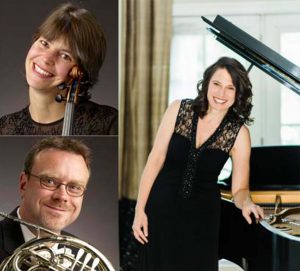by David Kulma

Trautwein and Wolf gave Bach’s Sonata No. 6 in G an effervescent reading full of clarity and poise. Wolf unfurled pearly notes that were pleasantly dry and buoyant, and Trautwein spun out precise, intimate lines with light vibrato. Bach is so elaborate on the page that his music can work without extra ornamentation, but it might have added some fun to this purposefully dignified reading.
Stravinsky’s Suite Italienne from 1932 is a spunky rehash of his 1920 Neoclassical ballet Pulcinella. Better described as Neobaroque, the six-movement duo made with violinist Samuel Dushkin ably remixes this faux Pergolesi as a virtuosic showpiece. Most of it perfectly fits what classical musicians learn about Baroque style — straightforward tonality, dance-based rhythms, and beautiful melodies. But along the way, Stravinsky adds wonky ostinato textures and angry, pounding, modernist chords. Trautwein and Wolf played with great finesse and lyrical splendor, even in the more pungent Stravinskian moments.
After an intermission of cookies and wine, King, Trautwein, and Wolf gave a drop-dead gorgeous performance of Brahms’s Horn Trio in E-flat, Op. 40. King delivered delightfully deadpan remarks about Brahms and the natural horn versus the valve horn while he emptied the moisture from his instrument.
The breadth of the four movements showed each performer off to their best. The complex textures allowed Wolf to pull a beautiful tone out of the baby grand piano. Trautwein was in her element both playing long melodies and elaborate secondary lines. King was in wonderful form in Brahms’s heralding motives and chromatic arcs. He said he was immensely grateful that Brahms wrote this music, and based on this performance, everyone should be.
As an encore, Trautwein and Wolf played Fritz Kreisler’s Liebesleid (“Love’s Sorrow”) with pleasant elegance. A little more of Kreisler’s over-the-top schmaltz might have inspired more of a nostalgic tear.
Published on ClevelandClassical.com March 18, 2019.
Click here for a printable copy of this article


